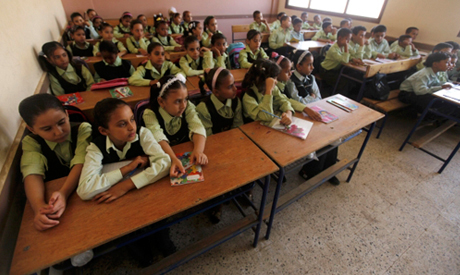
Students attend class on the first day of their new school year at a government school in Giza, south of Cairo, September 22, 2013 (Photo: Reuters)
Education Minister Mahmoud Abou Nasr unveiled on Saturday a long-term plan to improve education in Egypt, which has been deteriorating for years, Al-Ahram daily reported.
In a five-hour meeting with President Abdel-Fattah El-Sisi, Abou Nasr explained that the plan would commence its preliminary stage from 2014 to 2017, and it would last until 2030.
The plan includes the introduction of a nutrition programme in all public schools, eliminating illiteracy, and reducing the number of students dropping out of school.
Free extra classes will be offered, he added. The plan also aims to prepare 50,000 to 60,000 teaching graduates over the course of two years to work in Gulf states suffering from a lack of competent teachers, in addition to preparing graduates for domestic teaching jobs.
El-Sisi said that supporting cooperation between African nations in education was also necessary, calling for sending education experts to African states.
According to the minister, efforts to improve education in the country have already started. Abou Nasr said around 30 percent of the school curriculum has already been changed, adding that the remaining 70 percent will also be improved.
The ministry, in cooperation with concerned entities in the United Arab Emirates, are also working on the development of technology in schools known as The Million Student Project.
Educational buildings and facilities are also set to be improved and new ones built, in addition to reducing the number of pupils in classes to eventually reach a maximum of 40 per class in the preliminary stage.
The minister further called on members of civil society to provide the needed funds for the ministry to establish new schools.
"Funding is crucial for recruiting teachers, which was one of the obstacles for their plan to be realised," he added.
For his part, El-Sisi spoke of the need for enhancing the status of teachers in Egypt through establishing a plan to gradually increase their salaries, in addition to regaining their status in society.
Another suggestion made during the meeting was to celebrate an Education Day each year to celebrate distinguished students.
Egypt has long suffered from a deteriorating education system, which has been mainly blamed on insufficient investment by the government.
Article 19 and 21 of the 2014 national charter requires the state to allocate at least four percent of the budget to education and two percent to higher education. The new charter also states that the allocated percentages will be gradually increased "until they meet global rates."
The 2012 constitution, which was drafted under the presidency of Mohamed Morsi, obliged the state only to allocate “an adequate amount" for the items on the state budget.
Public spending on education in the 2014/15 budget will be LE94.4 billion, compared to LE83.5 billion the previous year, according to the finance ministry website.
Short link: